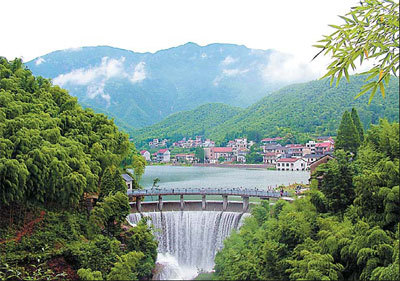Once-obscure Anji County is now far better known after hosting an epic martial arts battle in the bamboo, shot for Crouching Tiger Hidden Dragon, which won the 2001 Oscar for best foreign-language film.
In northern Zhejiang province, Anji is also known as the first National Ecological County in China.
It is also noted for taking the initiative to maintain its environment. The local government is declining polluting enterprises, a move made easier by natural resources that have already made Anji one of the nation's 100 richest agricultural counties,

Scenic Anji is one of the 100 richest agricultural counties.
Anji rejected 2 billion yuan worth of foreign investment in the past three years, which translates into a loss of some 4 billion yuan in GDP, according to its government website.
Instead, the county has developed eco-tourism, agriculture and industries.
The county hosted 4.5 million tourists in 2007, earning it 1.66 billion yuan, 12 percent of its GDP.
Tang Zhongxiang, Party chief of Anji, says he is stressing a balance between economic development and environmental protection.
Eco-friendly agriculture and production, such as making bamboo furniture, mats and other goods, are strategies that the government has developed for a sustainable economy. Its favorable climate also enables flourishing tea and alpine vegetables.
Such products currently contribute 62 percent of Anji's agricultural output, while per capita income of farmers has doubled to 9,196 yuan in the six years from 2001.
Statistics show that farmers' annual income in Zhejiang averaged 8,100 yuan in 2007, continuing its position - now held for 23 years.- at the very top among all provinces in China.
Anji white tea, grown nowhere else in the country, sells at a higher price than the famous longjing or Dragon Well teas.
Ecological economic development has also paved the way for rural construction.
In July 2007, Yaowu village of Anji and Huzhou Daxing Co Ltd signed a contract in which Daxing will invest 12 million yuan to help build Yaowu's village infrastructure.
In return for about 10,000 sq m of land to develop a holiday resort, Daxing will share revenue from the land to build Yaowu's infrastructure.
According to Tang, the arrangement is Anji's version of "new rural construction" to sustain a growing economy in an environmental way. Outside investment is welcome in Anji, but "the local environment protection bureau has the final say in deciding whether to accept investment proposals", says Le Yejun, director of Anji economic and trade committee.
"We once held back a development project by Jiangsu Taicang Taiwan Merchant Association," Le notes, rescinding it due to air and water pollution concerns.
It was undergoing a trial period before it was halted, and 5.8 million yuan had already been invested. "We paid 1.2 million yuan to its Taiwanese merchants for the recall," says Wu Yineng, head of the environment protection bureau.
According to the bureau's official website, nearly 30 polluting companies were either put under stricter controls or closed in the past two years, including some highly profitable - and highly polluting - bamboo fiber manufacturers.
"Our ecological evaluation standards are stricter than national policies," Wu says.
Despite its restrictions, Anji has attracted large numbers of investors that spent more than $100 million In 2007 alone. Last May, India's Tata Group formed a joint venture in Anji, with an initial investment of $16 million to produce tea and related products.
Yu Dong, publicity director for the country, is confident about the future. "We are the green engine for the Yangtze River Delta," he says. "Our fresh air will make Anji more profitable for years to come."
(China Daily March 3, 2008)